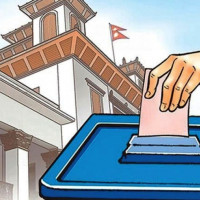- Sunday, 1 March 2026
Gandaki Province moves to legalise cannabis cultivation
By Phadindra Adhikari,Lekhnath, Nov. 12: The Gandaki Province government has taken a significant step towards legalising the regulated cultivation of cannabis for medicinal and industrial purposes.
The Cannabis Cultivation Regulation and Management Bill 2082 was tabled in the provincial assembly on Monday, paving the way for controlled production under government supervision.
Cannabis grows naturally across several districts of Gandaki Province and discussions about utilising barren land for cannabis farming to promote economic growth have long been ongoing.
The new bill, registered by the Ministry of Industry and Tourism on September 22, was tabled for general discussion in Monday’s assembly meeting.
The proposed law strictly prohibits individual cultivation of cannabis, while allowing registered companies or farms with a Permanent Account Number (PAN) to grow it for medicinal or industrial use.
Once enacted, it will open the door for legal cannabis farming in Gandaki Province, provided that all government regulations are followed.
Who can grow cannabis and how?
The bill explicitly bans individuals from cultivating cannabis. Only officially registered companies or farms will be eligible to grow cannabis for two specific purposes, medicinal and industrial.
Clause 4 of the bill states that no prior approval will be granted for farms cultivating less than two ropanis of land. Farmers may grow cannabis on their own property, or on rented or leased land.
Applicants must obtain two levels of government consent, initial approval to prepare for cultivation, followed by a formal licence once infrastructure is ready.
To apply, firms must submit details including their company registration, recommendation from the local government, the intended use of the crop and proof of a purchase agreement for the final product.
An independent Cannabis Regulation and Management Unit will be established under the Ministry of Internal Affairs to oversee and monitor the process.
This unit will inspect proposed cultivation sites and, if found suitable, issue permits valid for five years. Applicants will have up to one year after initial approval to develop necessary infrastructure before applying for final permission.
Regulations for sale and distribution
The bill allows cannabis farming strictly for medicinal and industrial purposes, which must be declared at the time of initial approval. From cultivation to sale, the process will remain tightly controlled.
Farmers must notify the regulatory unit, the nearest police office, and a local monitoring committee before harvesting, storing, or selling cannabis.
A seven-member local monitoring committee, chaired by the ward chairperson, will supervise compliance.
Harvest dates will be set by the inspection officer, and unharvested crops can only be cut with written approval from the local committee coordinator.
Clause 14 mandates that any remaining cannabis not used for medicinal or industrial purposes must be destroyed to prevent misuse.
Produced cannabis cannot be sold freely. It must be sold only to the pre-approved buyer under a formal agreement.
After packaging, the regulatory inspector will seal the product before it can be transported. If the agreed buyer refuses to purchase, the farm must seek written approval from the regulatory director to sell it to another authorised company. Cannabis purchased for one approved purpose cannot be diverted for another use.
Penalties for violation
Clause 21 of the bill outlines penalties for violations. Anyone cultivating, selling or distributing cannabis without permission or farming outside approved areas will be prosecuted under Nepal’s prevailing narcotics laws.
Offences such as failing to maintain records, not reporting data on time, transporting cannabis without official sealing, or engaging in unauthorised activities may result in fines ranging from Rs. 50,000 to Rs. 500,000. Based on inspection reports, the regulatory director will determine the appropriate fine depending on the severity of the offence. Licences can be revoked for reasons such as failing to renew on time, selling to unauthorised buyers, not building required infrastructure, withholding data, or violating licence conditions. Provisions regarding foreign investment, export, and sale of cannabis-based products will be governed by federal law.
Reactions from provincial assembly members
Speaking on the bill, CPN-UML provincial assembly member Ganeshman Gurung said cannabis had historically been one of the attractions that drew hippies to Nepal in the 1960s.
He suggested that Gandaki Province could brand and market its local cannabis globally. “We can promote it with a unique logo or trademark, even as the sacred herb of Lord Shiva originating in this province,” Gurung said.
Nepali Congress lawmaker Dilliram Subedi added that proper regulation could help utilise fallow land and increase provincial revenue.
Presenting the bill, Minister for Industry and Tourism Mitralal Basyal said the new law would support the province’s prosperity. “It will create employment opportunities and encourage people to return to their villages, leading to economic revitalisation,” he said.
The bill, which consists of five chapters and 29 clauses, will now be sent to a parliamentary committee for detailed discussion. It is expected to be reintroduced in the next assembly session along with the committee’s report for final endorsement.
















